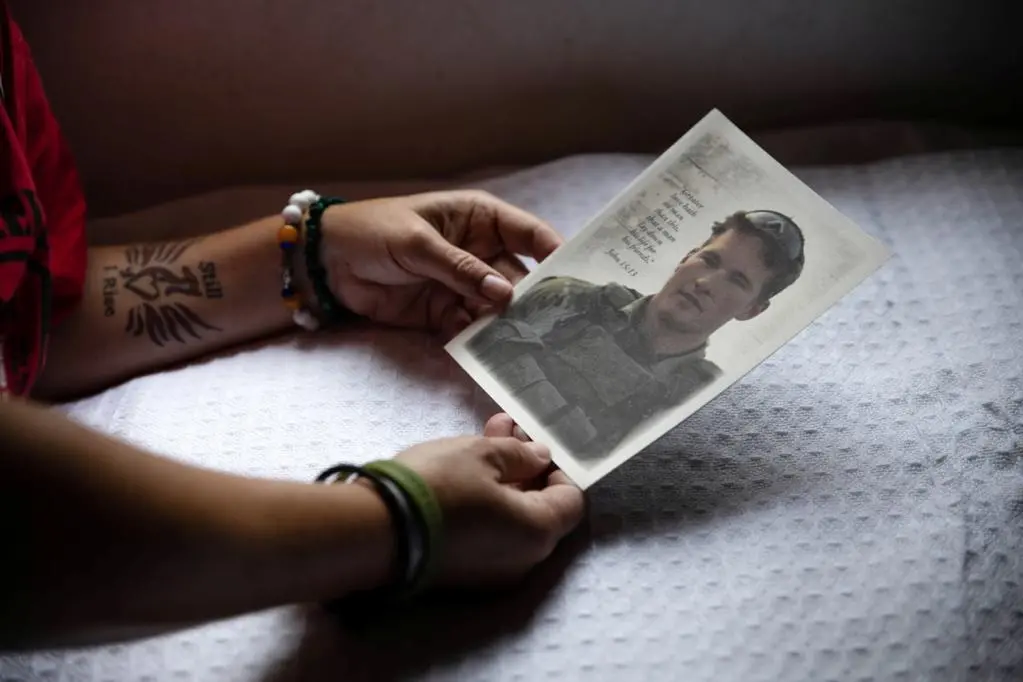PHOTO
MIAMISBURG, Ohio - Jill Stephenson lost her only child Ben Kopp, a 21-year-old U.S. Army Ranger, when he was shot during a 2009 firefight with Taliban forces in Afghanistan. For her, the militant group's takeover of Kabul this weekend came as a gut punch.
Stephenson is among the American families given gold star status by the U.S. military after losing a close relative serving in a war or other conflict. Her son was 13 when the United States was attacked on Sept. 11, 2001, and he vowed that evening to become an Army Ranger. He eventually deployed to Iraq and Afghanistan.
"Here we are 20 years later, and so you do question why did we even bother," said Stephenson, one of two Gold Star mothers who spoke to Reuters as Taliban insurgents swept across Afghanistan following President Joe Biden's decision to end the U.S. military mission there.
Stephenson, who lives in Bentonville, Arkansas, worries many Americans will now lose sight of the service of the nearly 2,500 members of the U.S. military killed during the 20-year conflict. "I hope their sacrifice doesn't get forgotten," she told Reuters.
As the Taliban emerge victorious from a conflict that started with al Qaeda's hijacker-led plane attacks on the United States, Stephenson and other Americans are speaking out about the sacrifice of their loved ones and pondering the lessons of U.S. involvement in Afghanistan.
On Sunday, the American flag was lowered and removed from the embassy compound in Kabul. Afghan President Ashraf Ghani has fled the country, and Afghans who assisted the United States are trying to escape amid chaotic scenes at Kabul's airport.
The Taliban triumph occurred just over 12 years after Kopp saved six fellow soldiers during a battle in southern Helmand Province in which he was shot in the leg. He suffered cardiac arrest on the operating table in Afghanistan and was left brain dead.
On July 18, 2009, eight days after he was shot, Kopp was taken off life support - but not before his heart, kidneys, liver, skin, bone and tissue were donated. His heart today beats inside Judy Meikle, 69, who was diagnosed with congenital heart disease a few months before Kopp died.
"It's an amazing gift," said Meikle, who spoke to Reuters from her home in Winnetka, Illinois.
Stephenson says she copes with the loss of her son by focusing on the blessings of his life and his organ donations. His major organs have saved the lives of four people, said Stephenson, who is now an organ donation advocate.
The Gold Star mother said she has never felt anger about her son's death. At a camp for Gold Star families and other veterans in Miamisburg, Ohio, Stephenson said: "I believe Ben's mission was completed in the time that he was here and he would not have been able to fulfill that mission had he not been an Army Ranger, had he not deployed to Iraq and Afghanistan, had things not turned out the way they did and him becoming an organ donor."
THE BEATING HEART
Jean Durgin's 23-year-old son, Army Sergeant Russell Durgin, a sniper leader, was killed by small arms fire on June 13, 2006 in Afghanistan's Korengal Valley. He had completed a combat tour in Iraq before heading to Afghanistan.
His 82-year-old mother, who lives in Henniker, New Hampshire, was saddened to watch the Taliban retake Afghanistan, adding that she sympathizes with the Afghan people and questions the U.S. mission there.
Her main message, she says, is one of remembrance. "It's our sons and daughters and husbands who have gone there to fight, and so many have lost their lives. So many have returned with the war still battling in their minds. People mustn't forget them."
Durgin said when her son died, she questioned his commanders: "Why wasn't there more cover How could you leave him up on that mountain with no cover"
She said she was told they didn't have sufficient numbers because fighters had been diverted to Iraq.
"That made me angry," she said. "Well, I was already angry. But that added to it."
"If we didn't have the numbers, why didn't we leave" she said, adding that she believes U.S. troops should have been pulled out of Afghanistan before her son was deployed there.
In April, as he announced America's withdrawal from Afghanistan, Biden said the Afghan people must decide their own future and that the United States should not have to sacrifice members of another generation in an unwinnable war.
Durgin, like Stephenson, said her son's death was not in vain.
"It was Russell's life. He made that decision I believe out of love for his country and because he believed we were doing the right thing."
"His life is not wasted because he lives on. People remember him. I'm surrounded by memorabilia, things people have sent me, things people do."
A bridge in Henniker has been named after Russell Durgin. A banner commemorating the hometown hero will soon adorn the town.
About 1,000 miles (1,600 km) away, Meikle keeps a picture of Kopp in her bathroom where she speaks to him silently every morning while brushing her teeth. "He beats stronger when I talk about him," she says.
(Reporting by Tim Reid Editing by Donna Bryson and Paul Simao) ((Timothy.reid@thomsonreuters.com; Reuters Messaging: tim.reid.thomsonreuters.com@reuters.net))





















